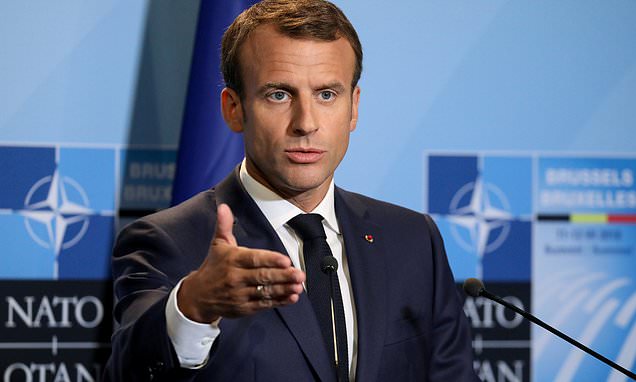America is turning its back on the European project. Time to wake up, the French president tells The Economist

EMMANUEL MACRON, the French president, has warned European countries that they can no longer rely on America to defend NATO allies. “What we are currently experiencing is the brain death of NATO,” Mr Macron declares in a blunt interview with The Economist. Europe stands on “the edge of a precipice”, he says, and needs to start thinking of itself strategically as a geopolitical power; otherwise we will “no longer be in control of our destiny.”
During the hour-long interview, conducted in his gilt-decorated office at the Elysée Palace in Paris on October 21st, the president argues that it is high time for Europe to “wake up”. He was asked whether he believed in the effectiveness of Article Five, the idea that if one NATO member is attacked all would come to its aid, which many analysts think underpins the alliance’s deterrent effect. “I don’t know,” he replies, “but what will Article Five mean tomorrow?”
NATO, Mr Macron says, “only works if the guarantor of last resort functions as such. I’d argue that we should reassess the reality of what NATO is in the light of the commitment of the United States.” And America, in his view, shows signs of “turning its back on us,” as it demonstrated starkly with its unexpected troop withdrawal from north-eastern Syria last month, forsaking its Kurdish allies.
In President Donald Trump, Europe is now dealing for the first time with an American president who “doesn’t share our idea of the European project”, Mr Macron says. This is happening when Europe is confronted by the rise of China and the authoritarian turn of regimes in Russia and Turkey. Moreover, Europe is being weakened from within by Brexit and political instability.
This toxic mix was “unthinkable five years ago,” Mr Macron argues. “If we don’t wake up […] there’s a considerable risk that in the long run we will disappear geopolitically, or at least that we will no longer be in control of our destiny. I believe that very deeply.”
Mr Macron’s energetic recent diplomatic activity has drawn a great deal of interest abroad, and almost as much criticism. He has been accused of acting unilaterally (by blocking EU enlargement in the Western Balkans), and over-reaching (by trying to engineer direct talks between America and Iran). During the interview, however, the president is in a defiant but relaxed mood, sitting in shirt sleeves on the black leather sofa he has installed in the ornate salon doré, where Charles de Gaulle used to work.
The French president pushes back against his critics, for instance arguing that it is “absurd” to open up the EU to new members before reforming accession procedures, although he adds that he is ready to reconsider if such conditions are met.
Mr Macron’s underlying message is that Europe needs to start thinking and acting not only as an economic grouping, whose chief project is market expansion, but as a strategic power. That should start with regaining “military sovereignty”, and re-opening a dialogue with Russia despite suspicion from Poland and other countries that were once under Soviet domination. Failing to do so, Mr Macron says, would be a “huge mistake”.
This article was originally published by “The Economist”
